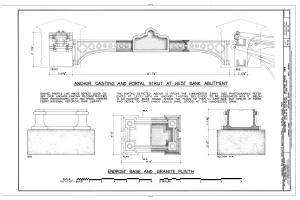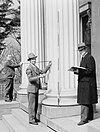File:Baltimore and Ohio Railroad, Bollman Bridge, Spanning Potomac River at Harpers Ferry, Harpers Ferry, Jefferson County, WV HAER WVA,19-HARF,28- (sheet 4 of 6).tif

Original file (14,444 × 9,632 pixels, file size: 1.05 MB, MIME type: image/tiff)
Captions
Captions
Summary edit
| Warning | The original file is very high-resolution. It might not load properly or could cause your browser to freeze when opened at full size. |
|---|
| HAER WVA,19-HARF,28- (sheet 4 of 6) - Baltimore and Ohio Railroad, Bollman Bridge, Spanning Potomac River at Harpers Ferry, Harpers Ferry, Jefferson County, WV | |||||
|---|---|---|---|---|---|
| Title |
HAER WVA,19-HARF,28- (sheet 4 of 6) - Baltimore and Ohio Railroad, Bollman Bridge, Spanning Potomac River at Harpers Ferry, Harpers Ferry, Jefferson County, WV |
||||
| Depicted place | West Virginia; Jefferson County; Harpers Ferry | ||||
| Date | Documentation compiled after 1968 | ||||
| Dimensions | 24 x 36 in. (D size) | ||||
| Current location |
Library of Congress Prints and Photographs Division Washington, D.C. 20540 USA http://hdl.loc.gov/loc.pnp/pp.print |
||||
| Accession number |
HAER WVA,19-HARF,28- (sheet 4 of 6) |
||||
| Credit line |
|
||||
| Notes |
|
||||
| Source | https://www.loc.gov/pictures/item/wv0291.sheet.00004a | ||||
| Permission (Reusing this file) |
|
||||
| Other versions |
     |
||||
File history
Click on a date/time to view the file as it appeared at that time.
| Date/Time | Thumbnail | Dimensions | User | Comment | |
|---|---|---|---|---|---|
| current | 08:26, 5 August 2014 |  | 14,444 × 9,632 (1.05 MB) | Fæ (talk | contribs) | GWToolset: Creating mediafile for Fæ. HABS 2014-08-04 (3601:3800) Penultimate Tranche! |
You cannot overwrite this file.
File usage on Commons
The following page uses this file:
Metadata
This file contains additional information such as Exif metadata which may have been added by the digital camera, scanner, or software program used to create or digitize it. If the file has been modified from its original state, some details such as the timestamp may not fully reflect those of the original file. The timestamp is only as accurate as the clock in the camera, and it may be completely wrong.
| Author | Library of Congress |
|---|---|
| Width | 14,444 px |
| Height | 9,632 px |
| Compression scheme | CCITT Group 4 fax encoding |
| Pixel composition | Black and white (White is 0) |
| Orientation | Normal |
| Number of components | 1 |
| Number of rows per strip | 4 |
| Horizontal resolution | 400 dpi |
| Vertical resolution | 400 dpi |
| Data arrangement | chunky format |
| File change date and time | 09:51, 27 October 2000 |

